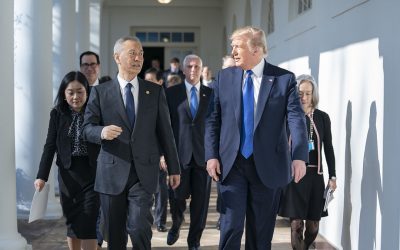The dollar has had its day
In this column Rabobank’s Chief Economist Dr. Wim Boonstra argues that the world is experiencing the latter days of the dollar era. In the absence of a different reserve currency any time soon, Dr. Boonstra advocates a return to a value standard that is not dependent on one country.
The US Treasury Secretary sent an urgent letter to Congress early january. It warned of an array of economic disaster scenarios that could arise if Congress does not approve raising the federal government’s lending ceiling.
While Congress will not approve this proposal without wrangling, a deal will no doubt be reached just before things really go awry.
The US is beginning to resemble Belgium more and more. Both countries’ government finances are off balance, with the US facing a deficit of approximately 9% of GDP and rapidly rising government debt. The Republicans and Democrats despise each other politically as much as the Flemish and Walloons do.
While the Belgians as a nation at least have a savings surplus, the only way for the US to finance its deficit is to borrow funds from abroad or print money.
US bankruptcy
US economist Larry Kotlikoff concluded some six years ago that when you took all the future obligations into account, the US government was actually already bankrupt.
That was long before the crisis. The situation since then has not exactly improved. The US will not, however, go bankrupt in the traditional sense because they can print dollars until the world drowns in them. And it is only a matter of time until that happens.
No good alternative to the dollar
It has been clear to me for some time that we are experiencing the latter days of the dollar era. But this does not mean the world will switch to a different reserve currency anytime soon.
This is because there are not at present any really good alternatives to the dollar. The euro has its own problems that European politicians have been unable to solve so far.
A side effect of the political turmoil surrounding the euro is that the currency is now relatively cheap, which is in turn good for German exports. You sometimes get the impression that it is being done on purpose. This comes with a range of dangers because it is extremely likely that the euro zone will once again run into trouble a couple of times this year.
The currency of China, which is the other economic superpower in the making, is not yet even in the running for becoming the standard. It will be decades before the renminbi will play a serious role as a trading, investment, reserve and vehicle currency.
And neither China nor the euro zone will ever attain a dominant world economic position that is even remotely close to that of the British Empire during the Gold Standard or the US just after World War II.
And by the time the renminbi can play a meaningful role, China’s position will probably have already come under threat by another potential superpower in the form of India. None of this bodes well for global exchange rate stability.
Breathe new life into SDR
It is consequently high time that the global economy returns to a value standard that is not dependent on one country. Something similar to gold under the Gold Standard, but then different.
Major disadvantages are, after all, attached to using gold as the standard of value. So it was with good reason that this system was abolished in the first place.
It would be better to breathe new life into the SDR, a basket of currencies managed by the IMF.
But this system will have to be adapted to ensure the SDR does justice to the relative power relations in the global economy.
A revised SDR foundation to which large currency blocs based on the dollar, an institutionally strengthened euro, the renminbi and perhaps eventually the rupee are linked could lead to a much more stable global economy.











